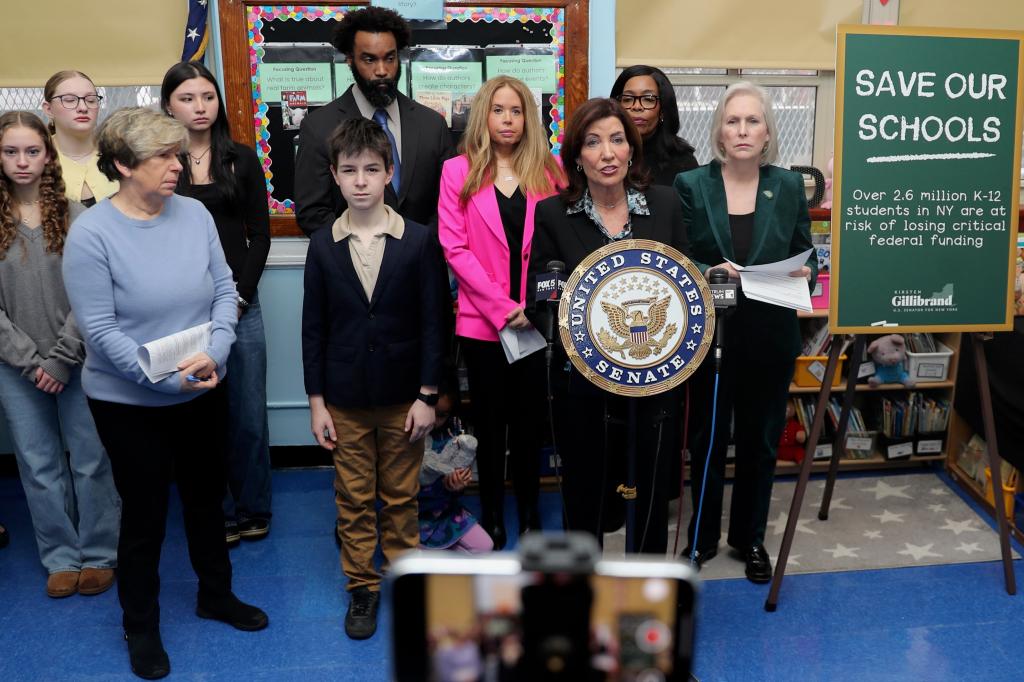World
Hochul, Gillibrand say NY communities will increase property taxes if Trump cuts Department of Education

The Threat to Public Education: A Warning from New York Leaders
New York Governor Kathy Hochul and Senator Kirsten Gillibrand sounded the alarm on Sunday about a looming crisis for public education in the state and across the country. The Democratic leaders held a press conference to address the potential elimination of the U.S. Department of Education (DOE), a move that President Donald Trump has hinted at as part of his broader effort to shrink the federal government. Hochul and Gillibrand warned that dismantling the DOE could have far-reaching consequences, particularly for New York, where the loss of federal education funding could lead to a significant spike in property taxes.
The Financial Impact on New York State
Governor Hochul emphasized the critical role the DOE plays in funding public education in New York. The state receives approximately $5.5 billion annually from the DOE, with $3.2 billion allocated directly to the state budget and $2.3 billion distributed to local governments. If the DOE were to be eliminated, these funds would disappear, leaving a gaping hole in the state’s education budget. Hochul warned that local governments, faced with the loss of federal funding, would have no choice but to raise property taxes to compensate. “Your largest part of your local property tax bill is your school taxes,” Hochul explained. “If that money evaporates from the federal government, where are they going to go? This is going to hit homeowners and businesses, and I want them to be aware of this consequence.”
Trump’s Plan to Dismantle the Department of Education
The threat to the DOE is not new. President Trump has been advocating for the elimination of the department since his first term in office, framing it as part of his agenda to reduce the size and scope of the federal government. During a September rally in Wisconsin, Trump reiterated his desire to “eliminate the federal Department of Education,” claiming that it has become a hub for government overreach and ideological indoctrination. “We will drain the government education swamp and stop the abuse of your taxpayer dollars,” he declared. While some programs currently administered by the DOE could potentially be absorbed by other federal agencies, many would likely be eliminated altogether.
The Consequences for Students and Families
The elimination of the DOE would have devastating consequences for millions of students and families who rely on its programs. Among the initiatives at risk are free lunch programs for low-income students and Pell Grants, which provide financial aid to roughly 7 million undergraduate students annually. These programs are lifelines for many families, and their loss would create significant barriers to education and economic opportunity. Hochul and Gillibrand stressed that the dismantling of the DOE would disproportionately harm vulnerable populations, including low-income students, students of color, and those in rural and underserved communities.
A Call to Action for Bipartisan Support
As the debate over the DOE’s future intensifies, Governor Hochul called on New York’s Republican members of Congress to take a stand. “I want to know where New York State Republican members of Congress are on this issue,” she said. “You are elected to represent the people who are going to be adversely affected, especially our children. And if you can’t speak up for them, then get out of your job and go do something else. We need your help.” Hochul’s comments reflect the urgency of the situation and the need for bipartisan cooperation to protect public education.
The Legacy of the Department of Education
The Department of Education was established in 1979 during the presidency of Jimmy Carter, with the goal of ensuring fairness and equality in access to education for all Americans. Carter believed that education was a fundamental right, and the creation of the DOE was a step toward realizing that vision. Today, the department plays a critical role in supporting schools, enforcing civil rights protections, and providing resources to students and families. While it is unclear whether the DOE would be dissolved outright or merged with another department, the stakes could not be higher for the millions of Americans who depend on its programs and services. As the debate over its future continues, leaders like Hochul and Gillibrand are urging lawmakers to consider the long-term consequences of dismantling this cornerstone of American education.
-

 Money3 days ago
Money3 days agoConsumer Financial Protection Bureau Adds Error Message To Home Page
-

 Money2 days ago
Money2 days agoWinning Content Strategies For Wealth Managers
-

 Australia1 day ago
Australia1 day agoTropical Cyclone Zelia intensifies to category 2 storm
-

 Asia1 day ago
Asia1 day agoWhat you need to know about 2024 YR4, the asteroid that could hit Earth in about eight years’ time
-

 Entertainment24 hours ago
Entertainment24 hours agoPrince Harry and Meghan Markle’s Best Moments and Photos From the 2025 Invictus Games
-

 Australia18 hours ago
Australia18 hours agoTropical Cyclone Zelia intensifies to category five system off Pilbara coast
-

 Politics1 day ago
Politics1 day agoDozens of religious groups sue to stop Trump admin from arresting migrants in places of worship
-

 Australia9 hours ago
Australia9 hours agoCyclone Zelia WA category 5 storm to hit Pilbara region near Karratha and Port Hedland









